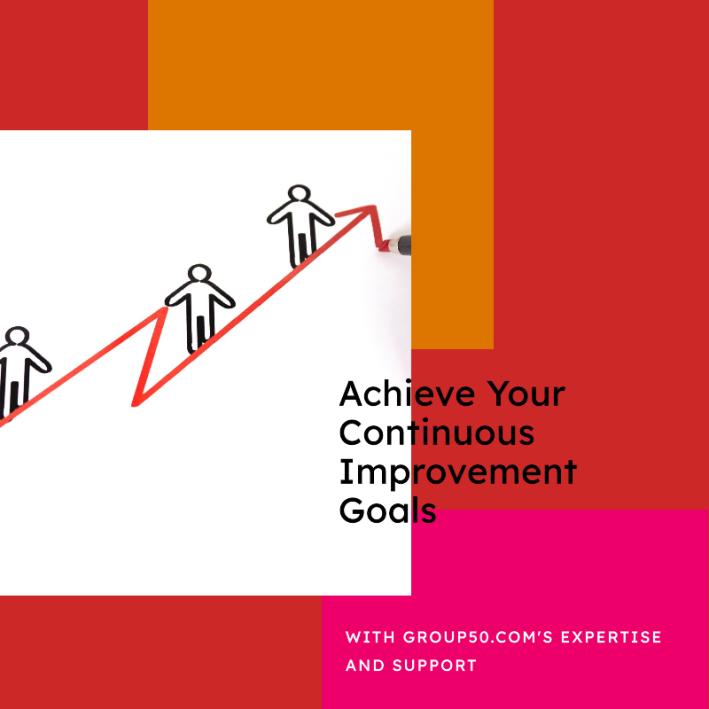Enhancing continuous improvement effectiveness through a culture of excellence

The goal of continuous improvement (CI) is to achieve better quality, efficiency, and overall performance with ongoing and incremental changes over time. Instead of making massive, radical changes, continuous improvement focuses on small, manageable improvements that accumulate over time to produce significant results. Kaizen, Lean, Six Sigma, and PDCA (Plan-Do-Check-Act) are popular methodologies for continuous improvement methodologies used by organizations to deliver higher quality products or services, eliminate waste, reduce costs, and make business operations more efficient.
The success of any continuous improvement initiative depends on various factors such as organizational commitment, employee engagement, and proper implementation. When effectively implemented and sustained, it can significantly contribute to an organization's success by fostering adaptability, enhancing quality, and boosting efficiency. Here’s a detailed look at continuous improvement effectiveness, and the factors that impact it.
Quality Enhancement: Continuous improvement helps reduce errors and defects, leading to better-quality products or services.
Increased Efficiency: One of the key focus areas of continuous improvement effectiveness is to eliminate waste and non-value-adding activities, and streamline processes. This leads to more efficient operations, time savings, and allows organizations to do more with less.
Cost Savings: Continuous improvement often leads to substantial cost reductions. Lower operational costs improve profitability and financial performance.
Adaptability and Responsiveness: A strong continuous improvement culture helps organizations stay agile and quickly adapt to changes in market conditions, customer expectations, or regulatory requirements.
Employee Engagement and Empowerment: CI initiatives make employees feel more empowered and motivated. Their insights and feedback can lead to meaningful changes that not only improve processes but also enhance job satisfaction.
Enhanced Customer Satisfaction: Continuous improvement effectiveness results in higher quality, faster delivery, and lower costs, that increases customer satisfaction and loyalty.
Experienced consultants with decades of experience
One of the leading firms offering continuous improvement effectiveness services to organizations of various sizes is Group50®̥ consulting firm, that has specialist consultants with over 20 years of corporate, manufacturing, and distribution experience in every functional discipline. The consulting firm’s Group50®̥ Advantage program makes use of specialized tools and methodologies for developing strategic plans, tactics and programs that are focused on the ideal future state of the company. The consulting firm makes use of sustainable and scalable continuous improvement effectiveness solutions that focus on the intersection of people, processes, technology, and cobotics.
Group50®̥ has developed unique Strategic Execution, Change Management, and Performance Management tools to increase the effectiveness of CI initiatives. The consulting firm’s proprietary change management framework, viz. Business Hierarchy of Needs®̥ includes three levels, viz.
Level 1: Strategy, Analysis, and Planning
Level 2: Knowledge and Change Management
Level 3: Implementation
Assessment of organizational health
Every organization does the things in the Business Hierarchy of Needs®̥ to some degree, the difference between organizations that have a culture of strategic execution and others that don’t is the disciplined change management methodology they follow. The consultants carry out the assessment of the organization’s existing processes, systems, and cultures, that helps establish a baseline and pinpoints specific inefficiencies, bottlenecks, or quality issues. The consultants design a tailored CI strategy that aligns with the organization’s goals. This includes selecting the appropriate methodologies (e.g., Lean, Six Sigma, Kaizen) and defining the scope and objectives of the continuous improvement effectiveness initiatives.
The specialist consultants bring their expertise to the table to accelerate results, by leveraging the best practices and proven techniques. The best part of engaging specialist continuous improvement effectiveness consultants is that they provide an external perspective on the organization’s processes and challenges, and tailor their recommendations to meet the specific needs of the organization. However, some organizations may be hesitant to adopt recommendations from external consultants. Overcoming this challenge requires effective communication of the benefits and involvement of internal stakeholders in the process.
Comments